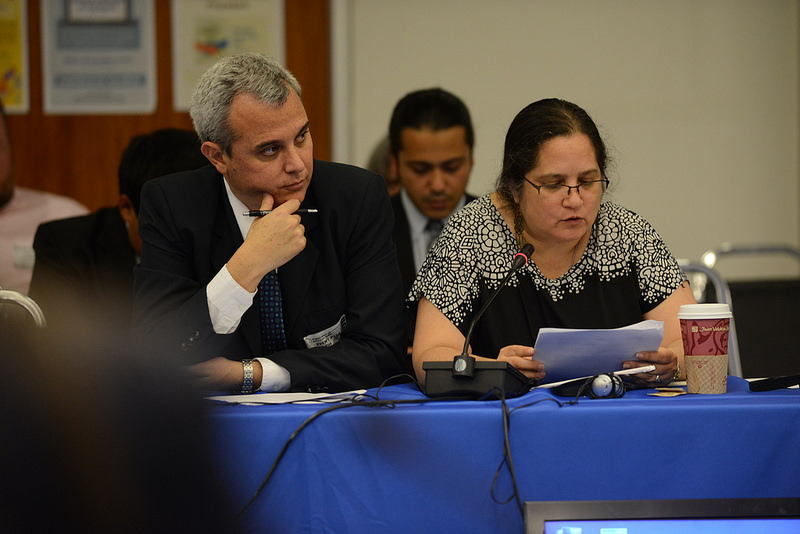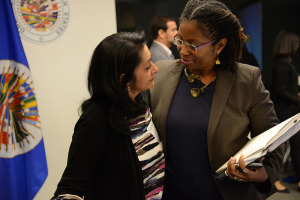
Credit: IACHR
The Inter-American Commission on Human Rights (IACHR) is holding its 153rd session from October 23 to November 7, 2014, with public hearings on October 27, 28, 30 and 31. The hearings allow both States and non-governmental organizations (NGOs) to provide the IACHR with information and context on 53 human rights issues, ranging from the impact of mining operations on human rights in Latin America, to the rights of refugee children and families in the Americas, to racism in the U.S. criminal justice system. Live webcasts of the hearings and video recordings of past hearings (in Spanish only) are available on the Commission’s website.
Racism in the U.S. Criminal Justice System
The IACHR conducted a hearing on racism in the U.S. criminal justice system on Monday, October 27. Representatives from the Lawyers Committee for Civil Rights under Law, American Civil Liberties Union (ACLU), NAACP’s Criminal Justice Program, Brennan Center for Justice at NYU School of Law the American Bar Association Criminal Justice Section, and the United States government participated in the hearing. The ACLU’s submissions to the IACHR focused on the racial disparities in U.S. sentencing decisions. See ACLU, Written Submission of the American Civil Liberties Union on Racial Disparities in Sentencing, Hearing on Reports of Racism in the Justice System of the United States, 27 October 2014.
ACLU of Michigan Racial Justice Project attorney Mark Fancher also testified regarding the fatal shooting of Milton Hall, a resident of Saginaw, Michigan, by police in 2012. [ACLU Press Release] The U.S. Department of Justice opted not to prosecute the police officers involved in the shooting, citing a lack of evidence of “willful misconduct” on the part of the police. [ACLU Press Release] The ACLU believes that the officers should have been prosecuted and is seeking an expanded investigation into the Saginaw police department, noting “an apparent pattern of racial profiling.” [ACLU Press Release]
The IACHR hearing follows a report released earlier this year by the United Nations Human Rights Committee, which raised concerns regarding “racial disparities at different stages in the [U.S.] criminal justice system, as well as sentencing disparities and the overrepresentation of individuals belonging to racial and ethnic minorities in prisons and jails.” Human Rights Committee, Concluding Observations on the Fourth Periodic Report of the United States of America, UN Doc. CCPR/C/USA/CO/4, 10-28 March 2014, para 6. To learn more about the Human Rights Committee’s report on the U.S., see IJRC’s previous news post.
The Internet and Human Rights
On Tuesday, October 28, the IACHR held a hearing on the internet and human rights. The hearing follows a report issued by the Special Rapporteur for Freedom of Expression in December 2013, which established “general principles for the protection of the right to freedom of thought and expression online” to guide States in ensuring “the full realization of the right to freedom of thought and expression through the internet.” Catalina Botero Marino, Special Rapporteur for Freedom of Expression, Freedom of Expression and the Internet, OEA/Ser.L/V/II, 31 December 2013, para. 3.
The Special Rapporteur defined four principles for freedom of thought and expression online: First, States should “progressively promote universal access” to the internet, internet technologies, and the “greatest possible amount of information available on the internet.” Freedom of Expression and the Internet, para. 15. Second, States should promote and maintain “informational pluralism,” recognizing that maximizing participation in public debate is critical to the democratic process. Freedom of Expression and the Internet, paras. 18 and 19. Third, States should ensure non-discrimination both by ensuring that all persons—and especially members of vulnerable groups—can share their views online, and by guaranteeing that all online content is treated equally. Freedom of Expression and the Internet, paras. 20 and 21. Finally, States must preserve the right to privacy by themselves “refrain[ing] from interfering arbitrarily with individuals, their personal information and their communications” and by ensuring that private actors likewise “refrain from such abusive conduct.” Freedom of Expression and the Internet, para. 23.
To learn more about the Special Rapporteur’s report, see IJRC’s previous news post.
Human Rights and Social Protest in Mexico
On Thursday, October 30, the IACHR will hold a hearing on human rights and social protest in Mexico. Earlier this year, the Mexican state of Puebla enacted a Law for Human Rights and Police Force Regulation, which allows authorities to use deadly force against demonstrators as a last resort. [IPS News; Telesur] Legislatures in five other Mexican states have considered similar legislation to regulate social protest. [IPS News]
Human rights organizations have denounced the legislation as a violation of the right to assembly and peaceful protest. Their concerns were illustrated this past July when 13-year-old José Luis Tamayo was killed by a rubber bullet during an altercation between Puebla police and protestors. [Telesur] In September 2014, violent clashes between protestors and police in Mexico’s Guerrero state left six dead and 43 students missing. [Al Jazeera; NBC]. The violence started after police clashed with students who had commandeered several buses in a protest. Local police opened fire on the buses. A survivor claimed that police officers took 30 to 40 students away from the scene. These students have yet to be found. [Al Jazeera].
Other Human Rights Issues Addressed
Other hearings addressed human rights issues specific to the United States, Ecuador, Colombia, Venezuela, Cuba, Guatemala, Argentina, Nicaragua, Jamaica, Canada, Bolivia, Mexico, Honduras, Brazil, Costa Rica, Peru and Paraguay. The IACHR also held broader thematic hearings on the criminalization of human rights defenders, the right to food and seed regulation, sexual and reproductive rights, discrimination against trans persons, migrant detention, and the rights of migrant children, families and refugees.

Credit: IACHR
In addition, the IACHR held a merits hearing on Case 12.585, Ángel Pacheco León (Honduras), which was ruled admissible in 2006, and convened a hearing to follow up on the implementation of its recommendations in the Case 12.626, Jessica Lenahan (Gonzales) et al. (United States).
The IACHR also considered the Dominican Republic’s Naturalization Law 169/14, which was enacted to partially restore the rights of those deprived of their citizenship by a 2013 ruling of the Dominican Republic’s Constitutional Court. [OpinioJuris] Last week, the Inter-American Court of Human Rights (IACtHR) found numerous human rights violations related to the Constitutional Court’s ruling and the Dominican Republic’s treatment of individuals of Haitian descent. See I/A Court H.R., Case of Dominican and Haitian People Expelled v. the Dominican Republic, Preliminary Objections, Merits, Reparations and Costs. Judgment of August 28, 2014. Series C No. 282. (Spanish only). Learn more about the IACtHR’s ruling in IJRC’s previous news post.
A complete list of the 53 hearings can be found on the IACHR’s website.
To learn more about the IACHR and its role in protecting human rights in the Americas, visit IJRC’s Online Resource Hub.
